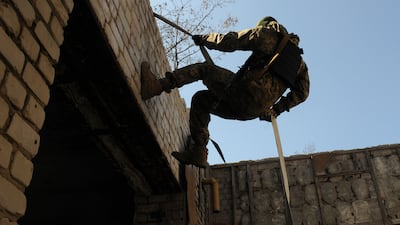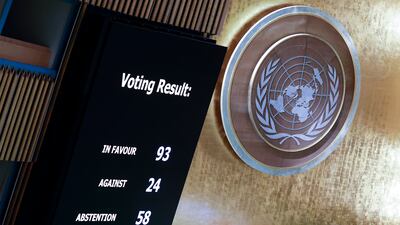Live updates: follow the latest news on Russia-Ukraine
Two of the European Union's top officials visited Ukraine on Friday in a show of solidarity with the country after Russian forces withdrew from around the capital.
European Commission President Ursula von der Leyen was visibly moved on a visit to Bucha, the town near Kyiv where evidence of an apparent massacre was discovered after Russia ended its occupation.
She also handed Ukrainian President Volodymyr Zelenskyy a form that could become the basis of an EU membership application.
“The unthinkable has happened here. We have seen the cruel face of [Russian President Vladimir] Putin's army. We have seen the recklessness and the cold-heartedness with which they have been occupying the city,” she said.
She and Josep Borrell, the EU's top diplomat, travelled by train from Poland for their first meeting with the Ukrainian president since Russia invaded in February. They were joined by Slovakian Prime Minister Eduard Heger.
It makes them the most senior European delegation to have visited Kyiv since war broke out, after the prime ministers of Poland, Slovenia and the Czech Republic as well as the president of the European Parliament previously travelled to the city.

Ms von der Leyen pledged to offer Mr Zelenskyy a speedier start to Ukraine's bid to become a member of the EU.
“Russia will descend in economic, financial and technological decay while Ukraine is marching towards a European future,” Ms von der Leyen said at a press conference alongside Mr Zelenskyy.
Handing Mr Zelenskyy a questionnaire, which will form a starting point for the EU to decide on membership for Kyiv, she said: “It will not as usual be a matter of years to form this opinion but I think a matter of weeks.”
Mr Zelenskyy said he would come back with answers in a week.
As Mr Zelenskyy repeated a call for harsher sanctions, Ms von der Leyen said the EU was mobilising its economy to ensure Mr Putin paid a heavy price.
The EU is also about to ban coal imports from Russia after ambassadors from the bloc's 27 countries approved the proposal late on Thursday.
A potential second step of banning oil deliveries will be discussed on Monday. Ukraine wants the EU to complete the set by stopping the gas imports on which it is most reliant.
Before the EU leaders arrived, as many as 50 people were killed and many more were wounded in a rocket strike at a railway station packed with civilians fleeing the threat of a major Russian offensive in the country's east.
Ukraine has been pressing the EU to speed up its membership application, an idea supported by many countries in the eastern part of the bloc but viewed more sceptically by senior leaders in the West.
The visit comes after Russian forces paused their offensive towards Kyiv and pulled troops away from the capital, revealing evidence of massacres in a number of towns.
The reported atrocities have spurred demands for more action from Ukraine's allies and pushed the EU into imposing sanctions on Russia's lucrative energy sector for the first time.
Mr Borrell said this week that the 27-member EU is Russia paying €1 billion ($1.09bn) a day for energy provisions, accounting for more than €35bn since the war started and dwarfing its military aid to Ukraine.
Mr Zelenskyy said the continuation of such payments would be taken in Moscow as “permission to go further” in attacking Ukraine and allow Russia “not to take seriously the negotiations on ending the war".
The sanctions package agreed to on Thursday, the fifth in the EU since Russia invaded, also includes a ban on port access for Russian vessels and further restrictions on trade.













































